Does Bleach Kill Cat Fleas?
Cats are beloved members of the family. Unfortunately, they can come with some unwelcome visitors – fleas. It might be tempting to reach for the bleach to eliminate the fleas. Now the question is “Does bleach kill cat fleas?”
Of course, bleach can kill cat fleas. Especially Germicidal Bleach can wipe out fleas and their eggs on hard surfaces. Bleach contains sodium hypochlorite, which can be toxic to fleas. However, it is important to make sure you do not get any of the bleach on your cat or any other pets, as it can cause irritation, burning, and can be dangerous for them.
In this blog, we’ll explore the risks of using bleach to kill fleas on cats and alternatives for controlling flea infestations.
Read Also:
Is Bleach Safe For Cats?
Bleach is not considered safe for cats, according to the experts. The chlorine content in bleach can be toxic to cats and can cause various symptoms. such as:
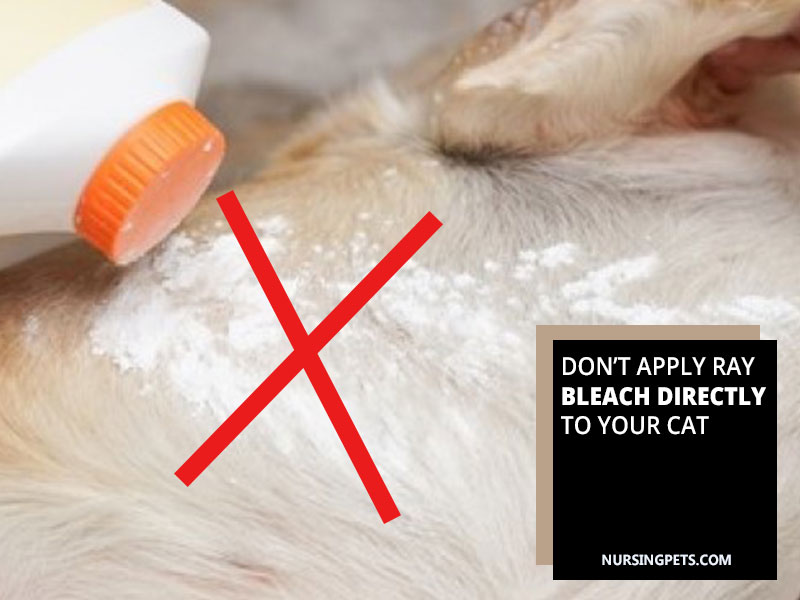
- Vomiting
- Tissue irritation
- Drooling
- Inflamed tongue
- High body temperature
- Reduced appetite
- Breathing difficulties
- Coughing.
If a cat has been exposed to bleach, it is advised to seek veterinary attention immediately. It is important to keep toxic chemicals like bleach away from pets and children.
How Long Does It Take For Bleach To Kill Fleas?
Bleach can kill fleas in a matter of seconds, but the exact time it takes for the fleas to die depends on the concentration of bleach being used. The higher the concentration of bleach, the faster the fleas will die.
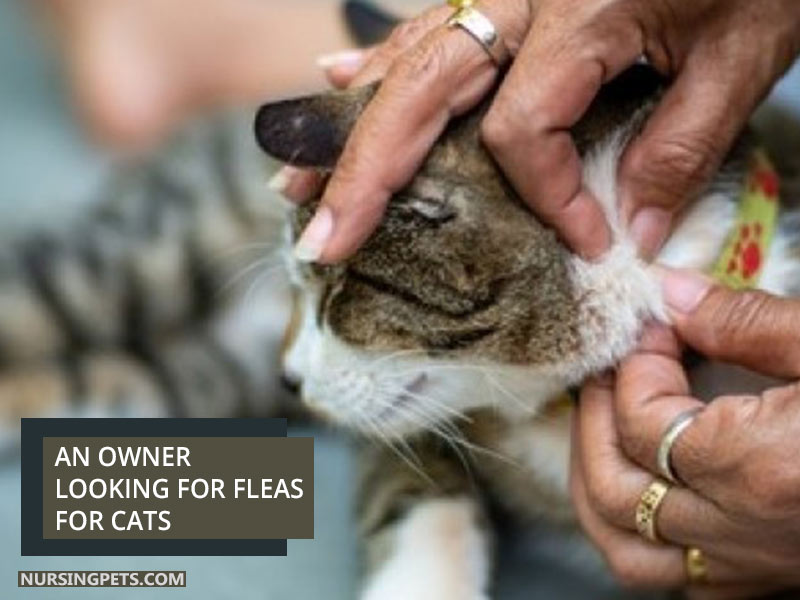
Household bleach that has been diluted can take between 10 to 60 minutes to disinfect. It may take 2-3 hours for the fleas to be completely killed. While bleach can kill fleas, it is hazardous to pets and should not be used on them.
It is suggested to use other strategies for flea control, such as vacuuming, dusting, and using a steam cleaner for carpets and upholstery, including pet beds. Multiple follow-up treatments may also be necessary to get rid of fleas.
Can Fleas Survive Bleach?
Bleach can kill fleas on contact. It contains sodium hypochlorite that can penetrate the cell walls of the insect and kill it. However, concentrated bleach can cause skin irritation and it is poisonous if ingested.
Protective gear should be worn when using it. Fleas must either be drenched or drowned in bleach to be killed. Unfortunately, Bleach is a limited solution and can only be used on surfaces, not on animals. So, it is not a reliable flea control solution.
Can Bleach Kill Cat Flea Eggs?
Bleach can kill cat flea eggs. Chlorine bleach is a potent insecticide that can be used to kill flea eggs, larvae, and adult fleas. Be sure to dilute the bleach and use it in a well-ventilated area to avoid breathing in the fumes.
We recommended using a steamer for thick fabrics or carpets to kill fleas and their eggs. You can also use insect growth regulators (IGRs). It’s very effective to kill flea eggs and prevent their hatching.
What Kills Fleas And Eggs On Cats Instantly?
No single safe solution can instantly kill all fleas and eggs on cats. However, several methods can be used together to quickly reduce the flea population and prevent its spread. Some of these methods include:
Flea shampoos: Washing the cat with flea shampoo is one of the quickest ways to kill adult fleas and their eggs.
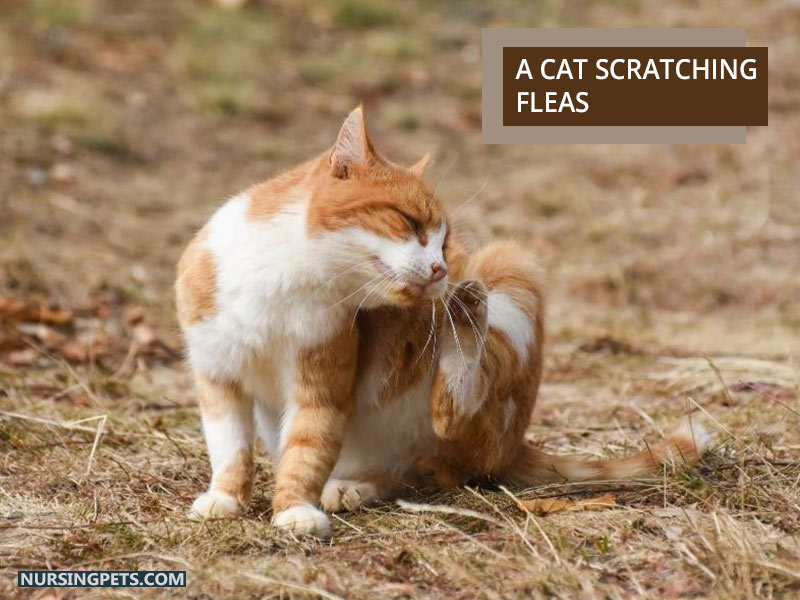
Combing: Using a flea comb can help remove fleas and their eggs from the cat’s fur. The comb can be coated with petroleum jelly to make the fleas and eggs stick to it, and then dipped in rubbing alcohol or soapy water to kill them.
Medications: Administering a flea medication specifically created for cats can kill fleas at every life stage (egg, larvae, pupa, and adult).
Keep in mind, while these methods can help get rid of fleas, they may not work instantly, and it’s advisable to follow the instructions and guidelines provided by the product’s manufacturer or veterinarian.
How To Get Rid Of/Treat Fleas On Your Cat
Whenever your cat has fleas, treat them quickly to prevent an infestation. Various tactics are available to treat fleas on your cat. Such as spot-on treatments, oral medications, shampoos, collars, etc.
There are several steps to get rid of fleas on your cat:
Check your cat for fleas regularly: Look for fleas on the neck, armpits, groin, and tail, which are favored areas for fleas to hide. Regularly checking your cat for fleas will ensure early detection of a flea infestation.
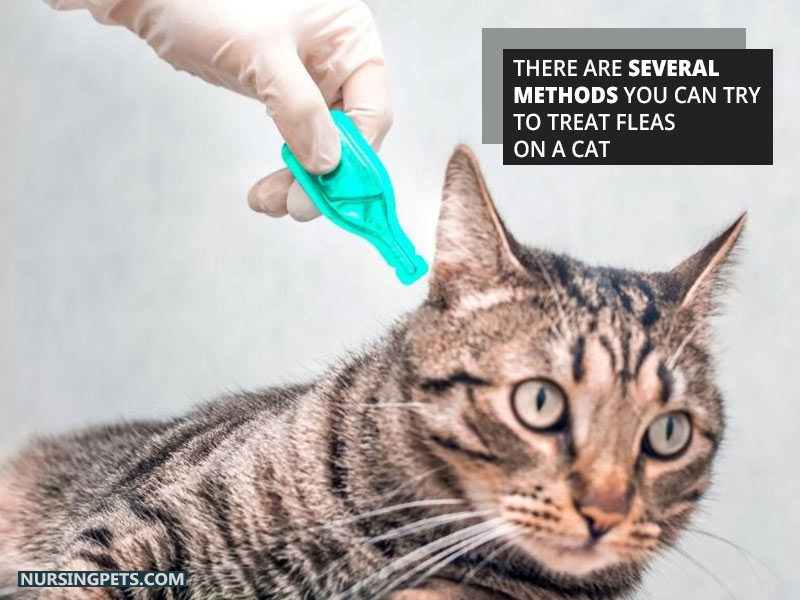
Bathe your pets with soap and water: Thoroughly bathe your pets with soap and water, then comb them with a flea comb. Pay careful attention to the face and neck regions, and the area in front of the tail. Soap will act as a gentle insecticide to kill adult fleas.
Use prescription-only flea control products: The best solution is to use prescription-only flea control products from your local veterinary clinic. This involves treating both your cat and your home.
Use medication: An oral medication called Capstar can get rid of live fleas on your cat. Capstar starts killing fleas in 30 minutes, but it does not prevent new fleas from coming back.
Purchase a quality flea collar: This will help to keep fleas off of your cat’s body. Be sure to follow the instructions on the package for proper sizing and usage. There are counterfeit products out there. Before purchasing a cat flea collar, be cautious and check our article “How To Tell If Seresto Cat Collar Is Real Or Fake?” [Our full blog]
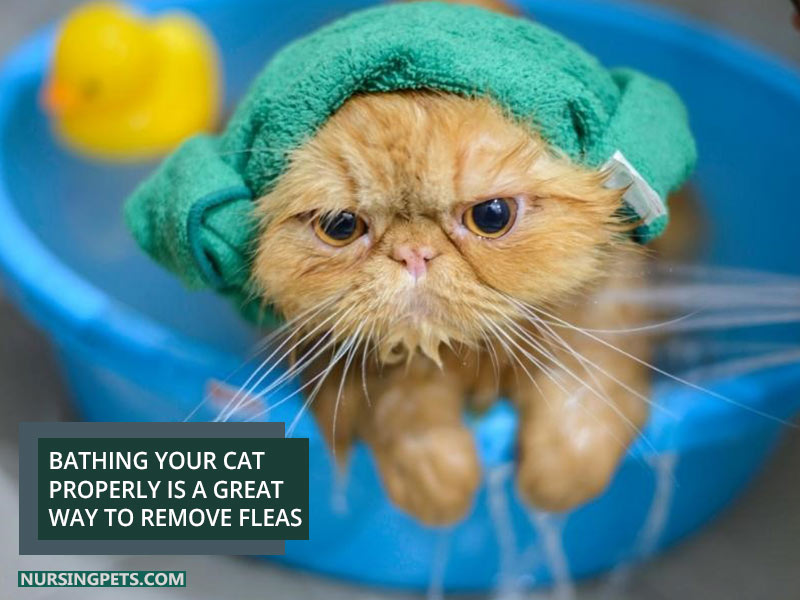
Spot-on treatment: One of the most popular and effective ways to treat fleas is spot-on treatment. Applied it between the shoulder blades specifically where the cat cannot reach it with its tongue.
If they lick it, the very bitter taste may cause them to drool, foam at the mouth, become nauseous or vomit. In this way, you can kill fleas within 24-48 hours. Be sure to follow the instructions on the package carefully.
Clean your home: Dispose of the vacuum cleaner bag straight away and wash your cat’s bedding, including anything your cat sleeps on. If the fabric can handle it, use a 60-degree cycle, as flea eggs can survive in lower temperatures.
Beware of using natural remedies: Be cautious before using natural remedies on your cat. These may not be safe for your cat and could end up making your cat sick and other problems.
It’s important to follow the instructions of your veterinary clinic and to avoid casual misuse of products, to ensure the health of your cat.
What Home Remedy Will Kill Fleas On Cats?
Although home remedies are not the best way to kill fleas in cats. Several home remedies can be used to kill fleas on cats:
Cedar Oil: Cedar oil is a non-toxic essential oil for cats but is hated by fleas and can be an effective natural flea repellent. You can spray the oil directly into your cat’s coat. Soaking the cedar oil on a collar creates your natural flea collar.
Soapy Water: Fill a shallow dish with a mixture of 1 cup of room temperature tap water and 3 tbsp of dish detergent. The solution will attract and trap fleas until you can remove them with other methods.
Vinegar and Water: Mix equal parts of vinegar and water in a spray bottle and use it to mist your cat’s fur. The vinegar smell will repel the fleas, and the fleas will eventually die.
Bathing: Bathing your pet using Dawn dish soap or a pet shampoo formulated for fleas. The dish soap can help to drown adult fleas, but it can also strip oils from your pet’s fur and dry out their skin.
It’s important to note that these remedies are not a substitute for professional veterinary care and it’s best to consult with a veterinarian before trying any home remedies on your cat.
How To Make A Homemade Flea Collar For Your Cat?
A homemade flea collar for a cat can be made using essential oils such as cedar oil. The oil is non-toxic for cats and effective as a flea repellent. You can place or soak the cedar oil on a collar and wrap it around the cat’s neck.
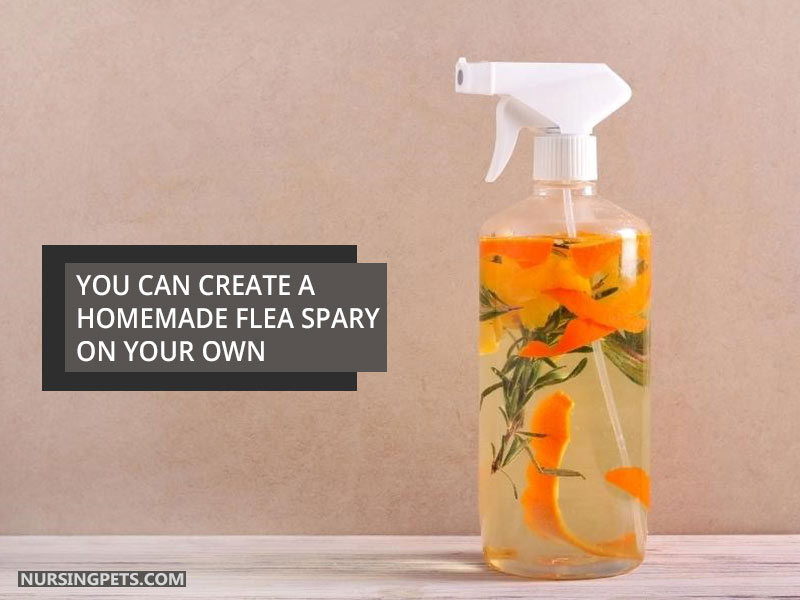
This will create a natural flea collar that will keep fleas away from your cat.
Does Spraying Alcohol Kill Fleas?
You can spray alcohol to kill fleas but it’s lethal for your cat. Drowning a flea in alcohol will result in its death. However, spraying alcohol can be hazardous to the pet.
Moreover, Isopropyl alcohol is possibly toxic to pets because it gets absorbed through their skin. In large enough quantities, it can even be poisonous.
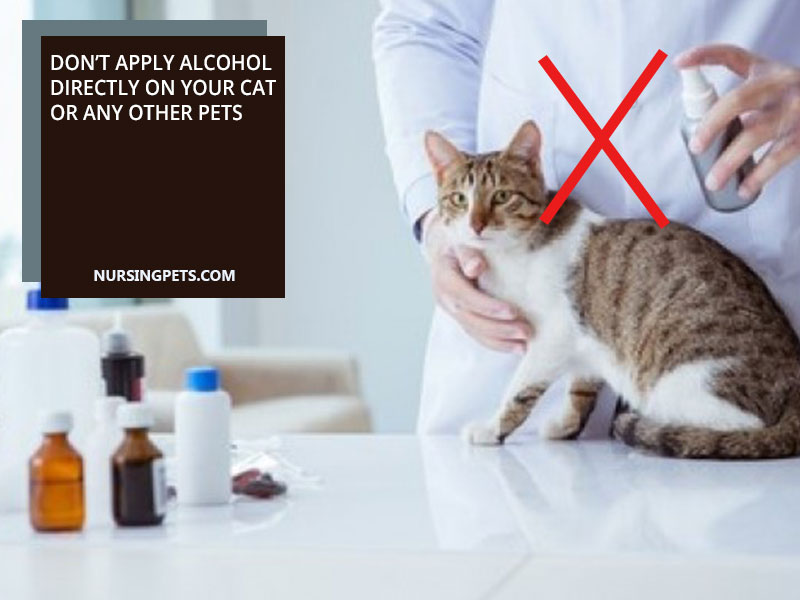
However, some commercially available flea sprays contain alcohol. You can use these products to kill fleas on your cat but this also can be harmful.
Moreover, the ingestion of rubbing alcohol may also trigger several negative impacts on pets. Symptoms of alcohol poisoning can begin within 30 minutes of consumption. Such as:
- Disorientation
- Vomiting
- Diarrhea
- Shortness of breath
- Shaking
- Stumbling
American Society for the Prevention of Cruelty to Animals (ASPCA) listed accidental ingestion of household cleaning products as the sixth top pet toxin of the year.
Therefore, it is not recommended to use alcohol as a flea treatment for pets. It is advisable to use flea treatments specifically formulated for pets and recommended by a veterinarian, to ensure the safety and health of your pet.
What Cleaning Products Kill Fleas?
We find several methods to kill fleas in your home, including using household items and insecticides. A list of various cleaning products that can kill fleas. Some common products include:
- Insecticide sprays
- Germicidal Bleach
- Flea bombs or foggers
- Flea powders
- Carpet powders
- Carpet sprays
- Upholstery sprays
- Vacuum cleaners
- Lysol
- Insect growth regulators (IGRs)
Don’t ever think to use this product on a cat. These are used only for cleaning hard surfaces and furniture in your home.
Another extremely important point worth making is to never, ever, ever use any product on a cat that’s labeled for dogs. A topical flea treatment for dogs applied to a cat can cause seizures or death. This also applies to shampoos. Any treatment for a cat must be specifically for cats, never dogs. Some ingredients are fine for dogs but toxic for cats.
Final Word
In conclusion, bleach can be used as an effective flea-killing agent, however, it is not recommended for use around cats as it can be extremely toxic to their health.
It is best to use a flea product specifically designed for cats that is more suited to their needs. There are many safe and effective flea control products available that will not put you or your pets at risk.
Article Reference:
- Hunker.com/12442407/does-bleach-kill-flea-eggs
- Vetinfo.com/control-house-fleas-infestation.html
- Petmd.com/cat/conditions/infectious-parasitic/best-flea-and-tick-medications-cats
- Cdc.gov/fleas/getting_rid.html
Image Sources:
- shutterstock.com
- Canva.com/photos

